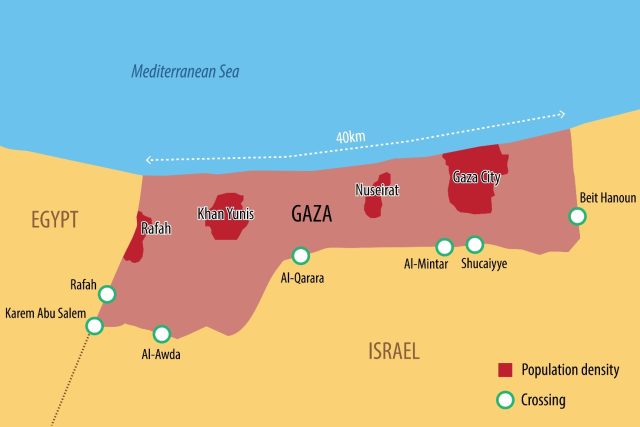
The Middle East conflict between Palestine and Israel is escalating. In recent days, the government of Benjamin Netanyahu has sent a ceasefire proposal to Hamas terrorists. The clauses of the agreement have of course not been made public, but from the leaked reports it seems that the Israeli proposal was much more open than the last ones that went wrong. Indeed, a 40-day ceasefire would be granted in exchange for the release of Jewish hostages by Hamas and the simultaneous release of scores of Palestinian prisoners in Jerusalem jails. Not surprisingly, the agreement was described as ‘extraordinarily generous’ by Antony Blinken, the US Secretary of State. Moreover, many Western countries, through their foreign ministers, have reportedly been pressing for Palestinian acceptance of the agreement. Hamas’s final yes was expected on 2 May, but according to sources close to the terrorist organisation, there were still too many obstacles to reach a complete agreement, as they were still far from a definitive ceasefire. In this sense, despite the uninterrupted diplomatic work and the recent openings by Israel, which, according to Blinken, is ready to accept important demands, the Jewish Prime Minister Benjamin Netanyahu has reiterated that he will never accept an end to the war in the Middle East. As a result, the process of reaching a comprehensive agreement between the two factions appears to be completely stalled: in recent days, Hamas member Sunhail al-Hindi stated that the terrorist group ruling Gaza “will respond negatively to the proposal for a ceasefire and the release of hostages, but discussions on the official response are still ongoing”. It is therefore clear that the only clause acceptable to Hamas is ‘an end to the fighting and the complete withdrawal of IDF forces from the Gaza Strip’.
A stalemate
The Middle East is thus in a complete stalemate. On the one hand, Netanyahu is trying to open a dialogue with Hamas in order to secure the release of the hostages through a military truce, while Hamas continues to demand a permanent ceasefire, which the Israeli government will never accept. On the other hand, the Jewish state has repeatedly threatened to launch a major military offensive on Rafah if no agreement is reached. For this reason, European and Western foreign ministers have not only tried to reach an agreement between Hamas and Israel, but have also reiterated the importance of guaranteeing the entry of aid to the civilian population through the humanitarian corridors, which must remain free. As part of the contacts between the authorities, US Defence Secretary Lloyd Austin spoke by telephone with Israeli Defence Minister Yoav Gallant: “Secretary Austin reiterated his commitment to the unconditional return of all hostages and stressed the importance of increasing the flow of humanitarian aid into Gaza while ensuring the safety of civilians and aid workers,” Pentagon spokesman General Pat Ryder told the press. “The secretary went on to note that any potential Israeli military operation in Rafah must include a credible plan to evacuate Palestinian civilians and maintain the flow of humanitarian aid.” The West’s objective must be not only to avoid escalation in the Middle East, but above all to fight the Hamas terrorists, whose fundamentalism threatens the whole of Europe, while defending the Israeli hostages and the civilian population of Gaza, who are also victims of Islamic terror. This requires the commitment of all actors on the ground, through an ongoing process of diplomacy that will put an end to the harassment of civilians. In this sense, Hamas’ compliance with the Israeli proposal would have been crucial.
The Israeli accusations and the Rafah raid
Hamas’s compliance, under pressure from the Egyptian authorities, came during the night, especially after the visit of Williams Burns, head of the CIA and head of the Task Force on Hostages, who, in contact with Qatari envoys, made it known that the agreement was now at an end, at which point it would have been difficult to dissuade Israel from the raid on Rafah. In fact, the news of Hamas’s willingness to accept the agreement came after yesterday’s telephone conversation between Netanyahu and Joe Biden, the US president, who said he was against the Rafah invasion. For their part, members of the Israeli government criticised the way in which Hamas allegedly accepted the agreement, accusing Egypt of changing the clauses of the agreement in order to win Hamas’ approval: “The Egyptians unilaterally forced all the parameters so that Hamas would agree, and this proposal is unacceptable to Israel,” they said from Jerusalem, while the Israeli economy minister said that in reality “Hamas did not accept the agreement. This is their usual trick. After these latest events, and after Israel’s warnings to civilians to evacuate the area, Israel entered Rafah: during the night a series of rockets hit the town, causing a dozen deaths, and IFD agents took control of the Rafah crossing on the Gaza side. According to Israeli sources, 20 militiamen were killed and three tunnel entrances were located. The Ifd also reported that, according to intelligence information, ‘the Rafah crossing on the eastern side was being used for terrorist purposes’. Again, the Ifd reported that ‘residents of eastern Rafah have been encouraged to temporarily evacuate to the expanded humanitarian area of Al-Mawasi’, where ‘field hospitals, tents and the availability of water, food, aid and medical supplies have been established’.



 Subscribe
Subscribe